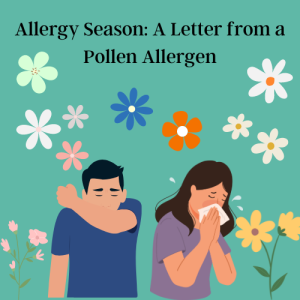Allergy Season: A Letter from a Pollen Allergen
By Ariane Tsai, C2ST Intern, University of Illinois Urbana-Champaign, Institute for Genomic Biology
Dear Host,
Hi, it’s me, a pollen allergen. I am writing to you because you seem to be experiencing some discomfort upon my arrival. Rest assured, I did not enter your body with any malicious intent. Allow me to share my side of the story in hopes of persuading you to let me pass through your body peacefully. Here is what happened:

On a beautiful spring morning, some of my fellow pollen allergens and I, enticed by a gentle, warm breeze, embarked on an adventure beyond the blooming garden. We encountered you and entered your body through your eyes. Not long after, we were spotted by some of your immune cells, specifically the mast cells. Terrified, surprised, and confused, they seemed unsure how to react upon our arrival and called for reinforcements. The B cells, stationed remotely at the spleen, answered the call and started producing immunoglobulin (IgE) antibodies specifically tailored to us, despite our harmless disposition. The antibodies attached themselves to the mast cells through a process called sensitization. With the help of IgE, the mast cells were armed and readily able to bind to some of my fellow allergens. Now activated, the mast cells used their newfound knowledge about us to release histamine, a chemical compound that dilates the blood vessels and allows more immune cells to travel to the site.
The mast cells were able to immobilize some fellow allergens, but our numbers were simply too great. To rally more reinforcements, the B cells continued to secrete an excessive amount of IgE to activate more mast cells. This cascade of events led to the release of more histamine by the mast cells, summoning more immune cells to the site. The excessive amount of histamine produced by this overreaction caused your symptoms: swelling, itching, sneezing, and nasal congestion.
While I sympathize with your immune cells’ dedication to safeguarding your well-being, I assure you we are merely transient foreign entities passing by. If your immune cells leave us be, there won’t be an excessive amount of histamine in your system that causes your discomfort. So, to alleviate your symptoms, consider taking some oral medication, such as anti-histamines, and drink plenty of fluids; we should pass by your body in no time.
Sincerely,
Your Friendly Neighborhood Pollen Allergen
References:
- https://www.hopkinsmedicine.org/health/conditions-and-diseases/allergies-and-the-immune-system#:~:text=When%20a%20harmless%20substance%20such,itchy%20eyes%2C%20and%20other%20symptoms.
- https://my.clevelandclinic.org/health/articles/24854-histamine#:~:text=Histamine%20is%20a%20chemical%20your,that%20can%20manage%20histamine%20levels.